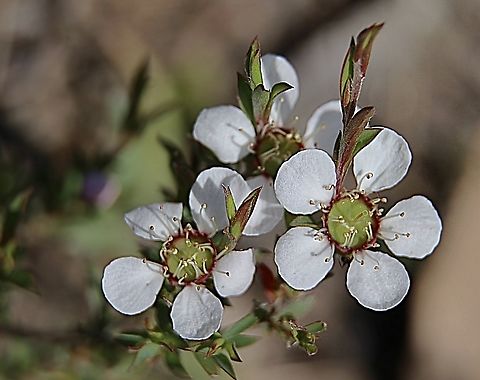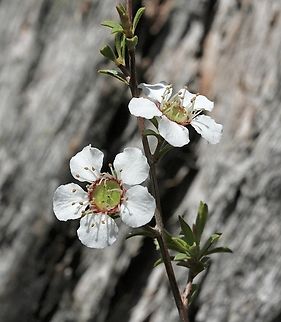
Appearance
"Gaudium myrsinoides" is a shrub that typically grows to a height of 1–2.5 m. The older stems have stems with thin, firm bark and younger stems smooth bark that is hairy at first and later shed in stringy strips. The leaves are linear to narrow egg-shaped with the narrower end towards the base, 5–10 mm long and 1–3 mm wide, tapering to a very short petiole. The flowers are usually borne singly, sometimes in pairs on short side shoots, and are white 5–10 mm wide and white. There are broad reddish brown bracts at the base of the flower bud but which usually fall off as the flower opens. The floral cup is about 4 mm long on a very short pedicel and is usually silky-hairy only on the lower half. The sepals are about 0.5 mm long, the petals 4–5 mm long and the stamens less than 1 mm long. Flowering mainly occurs from October to November and the fruit is a hemispherical capsule 4–6 mm wide with the remains of the sepals attached, but which fall from the plant soon after the seeds are released.
Naming
This species was first formally described in 1847 by German botanist Diederich von Schlechtendal who gave it the name "Leptospermum myrsinoides" in the journal "Linnaea: ein Journal für die Botanik in ihrem ganzen Umfange, oder Beiträge zur Pflanzenkunde". In 2023, Peter Gordon Wilson transferred the species to the genus "Gaudium" as "G. myrsinoides" in the journal "Taxon".Distribution
The heath tea-tree grows in heath and mallee from Eden on the far south coast of New South Wales to the Mount Lofty Ranges and Kangaroo Island and is widespread in Victoria.Habitat
The heath tea-tree grows in heath and mallee from Eden on the far south coast of New South Wales to the Mount Lofty Ranges and Kangaroo Island and is widespread in Victoria.References:
Some text fragments are auto parsed from Wikipedia.